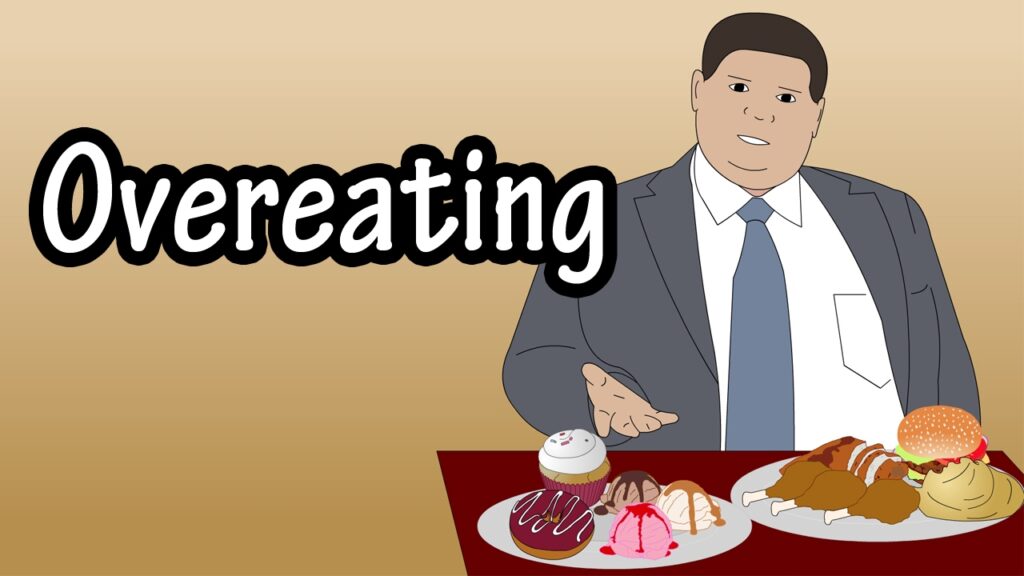Overeating
Overeating is the act of consuming more food than your body needs to meet its energy requirements. This can happen for a variety of reasons, including hunger, stress, boredom, or simply because you enjoy the taste of food.
When you overeat, your body may struggle to digest the excess food, leading to discomfort, bloating, and digestive problems. Overeating can also cause you to gain weight, as you are consuming more calories than your body can burn off.
While occasional overeating is not usually a cause for concern, regularly consuming too much food can lead to serious health problems over time, such as obesity, diabetes, heart disease, and other chronic conditions.
To avoid overeating, it can be helpful to eat slowly, pay attention to your body’s hunger and fullness cues, and practice mindful eating. You can also try to avoid eating when you are bored or stressed, and choose healthy, nutrient-dense foods to satisfy your hunger. Additionally, getting enough sleep, staying active, and managing stress can also help prevent overeating.
Few Possible Causes of Overeating:
There are many possible causes of overeating. Here are some examples:
- Emotional eating: Overeating can be a way of coping with emotions like stress, anxiety, boredom, or sadness. Food may provide comfort or a temporary distraction from negative feelings.
- Social pressure: Social situations, such as parties or gatherings, can lead to overeating. You may feel pressure to eat more than you need to fit in or be polite.
- Food addiction: Certain foods, especially those high in sugar, salt, or fat, can trigger a dopamine response in the brain, leading to cravings and overeating.
- Habit: Eating on a regular schedule or in response to certain triggers, such as watching TV or reading, can lead to overeating.
- Lack of awareness: If you are not paying attention to your body’s hunger and fullness cues, you may continue to eat even when you are no longer hungry.
- Medications: Some medications, such as steroids or antidepressants, can increase appetite and lead to overeating.
- Medical conditions: Certain medical conditions, such as binge eating disorder, can cause overeating.
It’s important to identify the cause of overeating and address it in order to establish a healthy relationship with food. Strategies like practicing mindful eating, seeking support from a therapist or support group, and making lifestyle changes to reduce stress and improve overall health can be helpful.
Overeating Side Effects:
Overeating can lead to a number of side effects, both short-term and long-term.
- Digestive problems: Overeating can cause bloating, gas, stomach pain, constipation, and other digestive issues.
- Weight gain: Consuming more calories than your body needs can lead to weight gain, which in turn can increase your risk of health problems like obesity, diabetes, and heart disease.
- Fatigue: After overeating, your body has to work harder to digest the excess food, which can leave you feeling tired and sluggish.
- Insomnia: Overeating at night can disrupt your sleep, leading to insomnia and other sleep problems.
- Nutrient deficiencies: Overeating can cause you to miss out on important nutrients, as you may be consuming too many calories from less nutrient-dense foods.
- Emotional issues: Overeating can also be tied to emotional issues like stress, anxiety, and depression.
- Poor self-esteem: Overeating can lead to feelings of guilt and shame, which can damage your self-esteem and confidence.
In general, overeating can have negative effects on both your physical and mental health, so it’s important to eat a balanced and moderate diet to maintain your health and well-being.
7 Tips can help you to eat less in night
Here are some tips to help you eat less at night:
- Eat a balanced dinner: Eating a well-balanced meal at dinner can help you feel fuller for longer, and reduce your need for a late-night snack.
- Avoid eating while distracted: Eating while watching TV or scrolling through social media can cause you to eat more without realizing it. Try to focus on your food and eat mindfully.
- Drink water: Sometimes we mistake thirst for hunger, so drinking a glass of water before eating can help you feel fuller and reduce your overall food intake.
- Limit alcohol consumption: Alcohol can increase your appetite and make it more likely that you’ll overeat. Try to limit your alcohol intake or avoid it altogether.
- Choose healthy snacks: If you do need a snack, choose something healthy like fruit, vegetables, or a small portion of nuts.
- Set a cut-off time for eating: Setting a time to stop eating can help you avoid late-night snacking. Try to stop eating at least two hours before bedtime.
- Plan your meals: Planning your meals in advance can help you avoid making impulsive decisions and reaching for unhealthy snacks at night.

